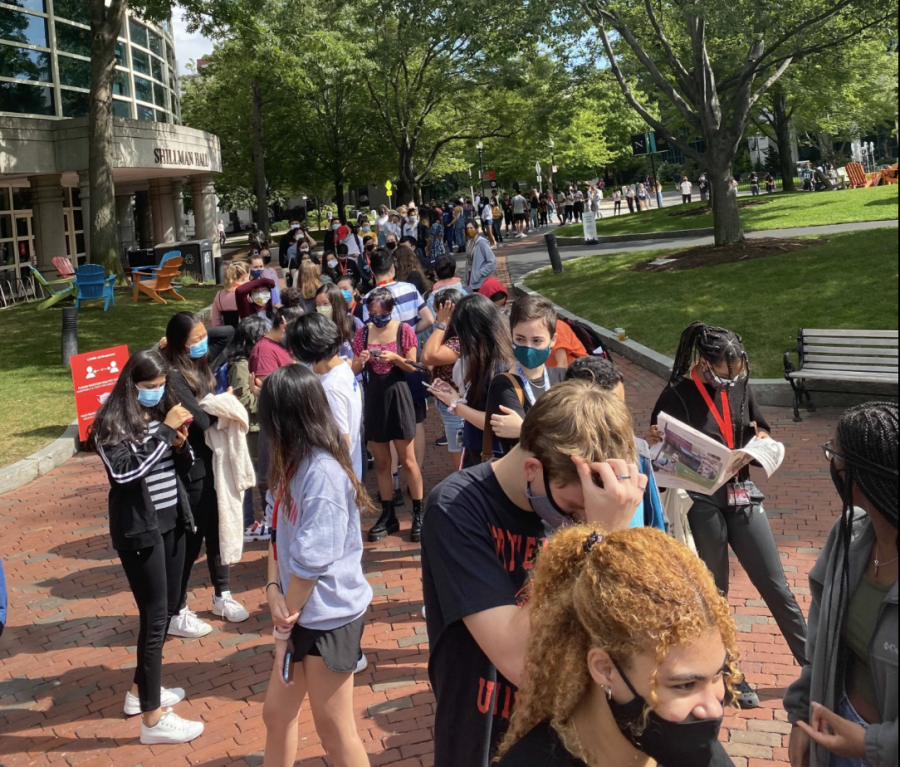Freshmen find community through social media, virtual events
NU’s “Stuff a Husky” event drew a substantial crowd of freshmen.
September 30, 2020
As Northeastern first-years adjust to the “new normal” on campus, their social interactions have become limited and time spent with peers has diminished. With restrictions on social gatherings, students, both on-campus and remote, have had to use virtual methods to try and communicate with fellow classmates and potential friends. Before even coming to campus, new students began socializing with each other through social media, especially through the Northeastern 2024 Facebook group.
“Over the summer I was in a whole bunch of group chats,” said first-year computer engineering and computer science major Anjiya Lakhani. “People have been reaching out [and] asking to go get dinner.”
First-years have had a variety of experiences based on the program they are enrolled in for the fall, with many students on campus but also some students who study from home. Notable differences include the creation of NU Start, a program exclusively for first-years consisting of asynchronous courses taken remotely. The university’s N.U.in program, which typically sends thousands of students abroad for their first semester, is now located in the Westin Copley Hotel in Boston. Students in these programs have adapt to the changes made by the university.
Sanya Bhatia, a first-year health sciences and business administration major participating in Northeastern’s NU Start program, occasionally commutes from her home in Shrewsbury, Massachusetts. She has found that group chats and social media have been increasingly important while living at home.
“I’m in a few group chats where people will ask, ‘Does anyone want to do this tonight?’” she said. “If I already have plans to go [to Boston], I’ll just go along.”
While Bhatia has been able to make friends through group chats, she also expressed that virtual classes were not the best environment for building relationships. As an NU Start student, where classes are completely asynchronous in order to allow students around the world to access them across time zones, she said, “It’s much harder, I don’t know anyone in any of my classes because there are people from all over the world.”
For students in the Hybrid NUflex program, the ability to make friends varies with each class, as some classes have had better environments for building relationships with face-to-face interaction. Other classes, however, have had limited discussion and student participation, restricting peer conversation.
“In my philosophy class, everyone has their webcams on and the professor facilitates a lot of the discussion,” said Venkat Pamulapati, a first-year computer science major doing remote NUflex from his home in Florida. “There are places where it’s possible to make friends.”
Pamulapati also mentioned an effort by Northeastern to help students meet others before arriving on campus in the fall called Husky Connect. According to Northeastern’s Student Orientation and Family Programs webpage, Husky Connect is “Northeastern’s premier networking site for new students and personalized space for all things Husky 101 Orientation.” Students met over the summer via Zoom to interact with fellow first-year students before attending classes.
“It was an attempt. I guess I wouldn’t say it worked,” Pamulapati said. “… They did a good job, I just don’t know what they really expected.”
Students on campus in the N.U.in program have had events of their own that they could attend. Anna Yerxa, a first-year cell and molecular biology student in the N.U.in Boston program said that the international coordinators of the N.U.in program organized events such as “Painting in the Park” that have helped N.U.in Boston students connect with their classmates.
Northeastern has tried other methods of helping students connect with one another, including their Welcome Week activities. While most of these events were virtual, the university tried to hold some events in-person where students could practice safe social distancing.
Abigail Sodergreen, a data science and business administration combined major, attended one of these traditional events, called “Stuff a Husky,” where students are able to create plush stuffed huskies and give them some accessories.
“It was a very good way to find a group of people and hang out with them doing something that’s pretty safe,” she said.
Without the security blanket of numerous events that normally would allow first-years to meet, they have shown initiative and taken it upon themselves to work around the restrictions and form meaningful connections.


















